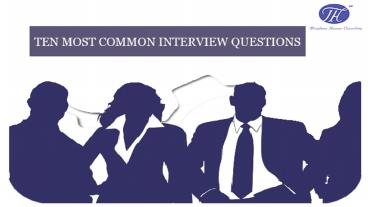Ten Most Common Interview Questions - PowerPoint PPT Presentation
Title:
Ten Most Common Interview Questions
Description:
At the end of every job interview, you’ll likely be asked if you have any questions. At this stage, ask open-ended questions about office culture and those that clarify the role. Also ask about – PowerPoint PPT presentation
Number of Views:134
Title: Ten Most Common Interview Questions
1
(No Transcript)
2
Tell me about yourself
- Give me a broad overview of who you are,
professionally speaking, before we dive into
specifics. - prepare about a one-minute answer that summarizes
where you are in your career and what youre
especially good at. - Keep your personal life out of it your
interviewer isnt asking to hear about your
family, hobbies or where you grew up.
3
What interests you about this job?
- Don't talk about benefits, salary, the short
commute or anything else unrelated to the
day-to-day work. - Interviewers want to hire people who have
carefully considered whether this is a job theyd
be glad to do every day.
4
Why did you leave your last job?
- Don't discuss conflicts with your manager or
co-workers, complain about your work or badmouth
employers - Job seekers are commonly advised to say theyre
seeking new challenges, but that only works if
youre specific about those new challenges and
how this job will provide them in a way your last
job didnt.
5
Why would you excel at this job?
- This is your chance to make a case for why you'd
shine in the job - Since this gets to the crux of the whole
interview, you should have a strong answer
prepared that points to your skills and track
record of experience and ties those to the needs
of the job.
6
What do you know about our company so far?
- Interviewers don't want you to simply regurgitate
facts about the company they're probing to see
if you have a general sense of what it's all
about. - If it looks like you haven't done any research
about the organization, your interviewer will
likely wonder how interested you really are and
whether you even understand what the company
does.
7
Tell me about a time when you proved skills in
previous organization.
- Good interviewers will ask about times you had to
exercise the skills required for the job. - These may be situations when you had to take
initiative, deal with a difficult customer or
solve a problem for a client. - Brainstorm the skills you'll likely need in the
job and what challenges youll likely face. - Then think about examples from past work that
show you can meet those needs. - When constructing your answer, discuss the
challenge you faced, how you responded and the
outcome you achieved.
8
What would you do in your first 90 days in this
position?
- Interviewers are looking for answers that reveal
how you set goals and solve problems, and whether
youre ambitious without being unrealistic. - You should also acknowledge that youll need to
take time to get to know the team, whats working
and what can be improved before you make any big
decisions
9
Whats most important to you in a new position?
- Interviewers want to understand your career goals
and whether this job will fulfill them. - After all, if youre looking for a job with lots
of public contact and a highly collaborative
culture, and this job is mostly solo work, it
might not be the right fit for you. - Its in your best interest to be candid and
specific when you answer this so you land in a
job that aligns with what will make you happiest.
10
What salary range are you looking for?
- If you wing your answer, you risk lowballing
yourself and ending up with a salary offer below
what you might have received otherwise - Its crucial to research the market rate for the
job ahead of time. - Dont let discomfort with talking about money
thwart your ability to negotiate well for
yourself.
11
What questions do you have for me?
- At this stage, ask open-ended questions about
office culture and those that clarify the role. - Also ask about next steps in the hiring process
and the employers timeline for getting back to
you. - Avoid questions about benefits and pay hold
those for once you have an offer
12
ThankyouTo Read More, Click Here































